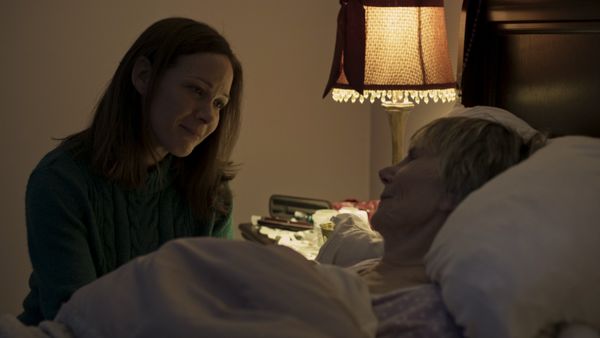Eye For Film >> Movies >> Marguerite (2017) Film Review
Marguerite
Reviewed by: Jennie Kermode

There's a scene about halfway through this film where the title character, who is in her late eighties and balancing with the aid of a walking frame, looks out of the window at a snow-covered landscape. Although her mind is on something else, it emphasises her captivity and the smallness of her world. Regular visits from a nurse, Rachel (Sandrine Bisson), provide her only regular human contact. Any conversation about more than medical matters is managed in fragments. Marguerite is a practical sort of person and perhaps that didn't matter to her so much before but it matters now, because now she has something to say.
An intimate study of the relationship between two women of different generations, this is a film that speaks volumes in just 19 minutes. Learning something about Rachel's personal life, Marguerite (Béatrice Picard) reflects on her own and on events long ago in a very different world. A lifetime of silence is about to come to an end. What was lost as a result of that silence can never be recovered. Through its quiet heroine, the film reflects on the experiences of millions of people around the world; through her small gestures it takes in the full horror of what was stolen from them. It also goes beyond its central subject to reflect more widely on mortality and the importance of living as opposed to just staying alive.

Picard, with experience drawn from a career that has spanned six decades, is superb in the central role. It would be easy to give this part too much, and it is the delicacy with which she handles it that makes the film work. The brevity of the scenes, the careful editing, eases us into the rhythms of Marguerite's life. First class set dressing and cinematography reveal the environment she has created for herself, and director Marianne Farley perfectly captures the details of what to means to be elderly and ill, to have surrendered types of privacy that most younger people take for granted, to have adjusted to decline. A wound in Marguerite's foot would be expected to cause horror in a different cinematic context, but she barely winces as it's treated; damage and pain like that are simply part of life. What matters now is the internal, and is there that wounds hurt most.
In the supporting role, Bisson is appropriately restrained. Rachel's primary concern for Marguerite is professional, of course, and she keeps her distance in the manner of people who know how easy it is to overstep the bounds of that and get drawn into friendships they can't possibly sustain. In later scenes, however, we see her carefully cultivated demeanour giving way and a new tenderness emerging. Shared experiences half a century apart connect the two, and in the process, younger viewers are invited to connect with history, to understand the impact and meaning of something that is now rarely discussed.
A strong contender in the upcoming awards season, Marguerite is a gem of a film: intelligent, precisely observed and unforgettable.
Reviewed on: 07 Oct 2018














